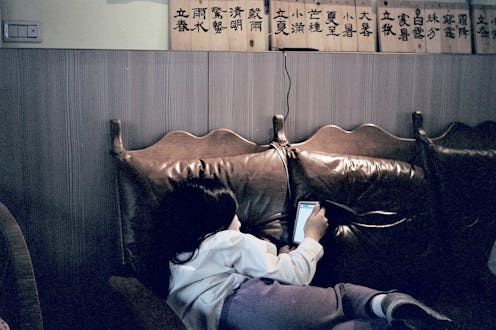
Of all the phobias out there, nomophobia is probably the most amusingly named. No knowledge of Latin or Greek will help you figure this one out because its origin has nothing to do with "nomos," the Greek term for law. Rather, the roots are English: "nomo" is a shortening of "no" and "mobile," and I guess "phobia" could be based off "phone" —or just the usual "fear." Either way, nomophobia is the fear of being without your phone, and apparently it's a real thing.
Though it's not yet a clinical diagnosis, some scientists have argued that this digital-age anxiety can reach pathological proportions. Iowa State University psychologists have even created a questionnaire to measure the severity of your nomophobia, which asks you to rate the accuracy of statements like "I would feel uncomfortable without constant access to information through my smartphone" (anyone else inclined to give that a "strongly agree"?). However, considering the condition, a pathology seems a bit laughable, given that 54 percent of people in the UK suffer from this phone dependency.
But even if nomophobia never makes its way into the Diagnostic and Statistical Manual (DSM) — the psychological equivalent of Gray's Anatomy — a few more long-standing, well-known phobias haven't either. Before you judge people with these conditions, keep in mind that we all have our thing — whether it's snakes, spiders, or heights — and our avoidance of them usually extends way beyond what's necessary to keep ourselves safe. Here are a few more phobias that you may never have heard of, but which are nevertheless very real to those who suffer from them.
1. Trypophobia
The images in this video are creepy, no doubt. But for some people, they're really creepy — because these people are afraid of clustered holes. Trypophobic Jen Pinkowski writes in Mental Floss that even bubbles of milk boiling in a pot are enough to make her "yelp and nearly leap out of [her] chair." Though it's not in the DSM, many people — 11 percent of men and 18 percent of women, according to one study — can attest that trypophobia is a real thing. Some scientists say the patterns most feared by trypophobics resemble dangerous animals. Unfortunately, while trypophobics are probably a step ahead of the rest of us in avoiding blue-ringed octopuses, their caution comes at the price of comfort around dew drops, honeycombs, coral, and other objects we're all pretty much bound to see at some point in our lives.
2. Bibliophobia
This one's roots are more obvious: As you might guess, bibliophobia is the fear of books. Unlike many phobias, bibliophobia is not considered irrational because people can usually pinpoint what they fear about books (rather than simply thinking they're creepy, as is the case with trypophobia or most animal phobias that go beyond dread of being attacked or bitten). I'd argue that nomophobia falls under the same category. But what is there to fear about books? Some people develop the condition due to stressful experiences with learning disabilities, while others do after reading something disturbing. In The Fear of Books, historian Holbrook Jackson argues that political and religious leaders have destroyed books throughout history due to bilbliophobia evoked by literature's potential to spread blasphemous or contrarian ideas.
3. Wiccaphobia
This is also exactly what it sounds like: fear of witches. Unlike bibliophobia, wiccaphobia is usually not based on formative childhood experiences with witches, well, for obvious reasons (though I must admit the movie The Witches is pretty darn scary when you're just a kid). But like the fear of books, it is historically specific. As you might expect, this one was more common during the "Burning Times" of the 14th through the 17th centuries in the U.S. and England. Yet somehow, the fear is still prevalent enough that there's a WikiHow on overcoming wiccaphobia with practical tips like remembering that not all Wiccans practice witchcraft and that at least they don't worship the devil. (Really, I can't make this stuff up.)
4. Allodoxaphobia
I'd give this advice to anyone, but allodoxaphobics should especially avoid reading comments on the Internet — because they're afraid of other people's opinions. Specifically, they fear opinions about themselves, usually due to past experiences with hypercritical parents or other authority figures. Nobody likes criticism, but these poor souls are so scared of it that they may avoid social interactions altogether. Lord help those who suffer from allodoxaphobia and nomophobia at the same time. We can only hope they don't suffer from bibliophobia as well so that at least they have some unopinionated reading material to retreat to.